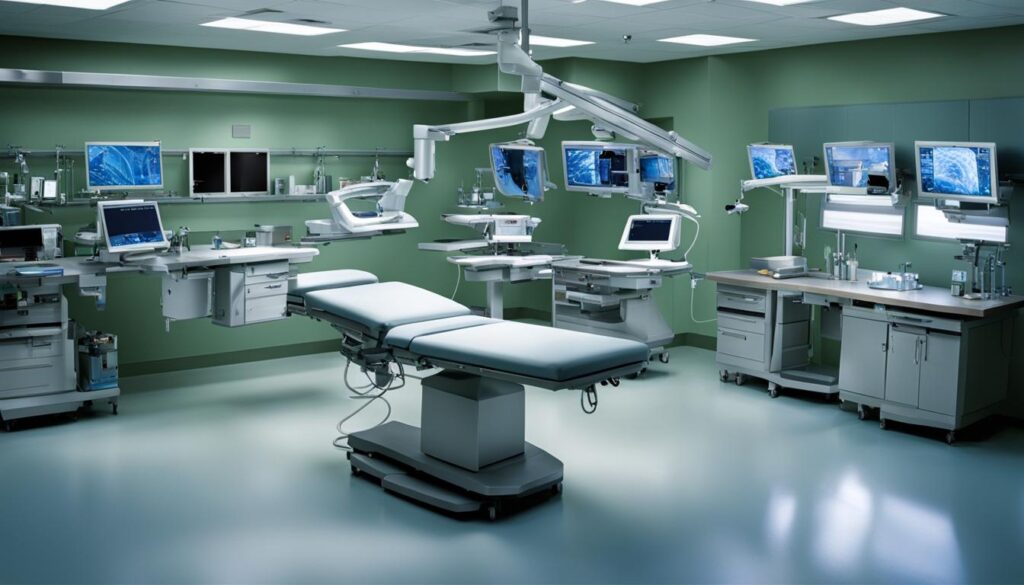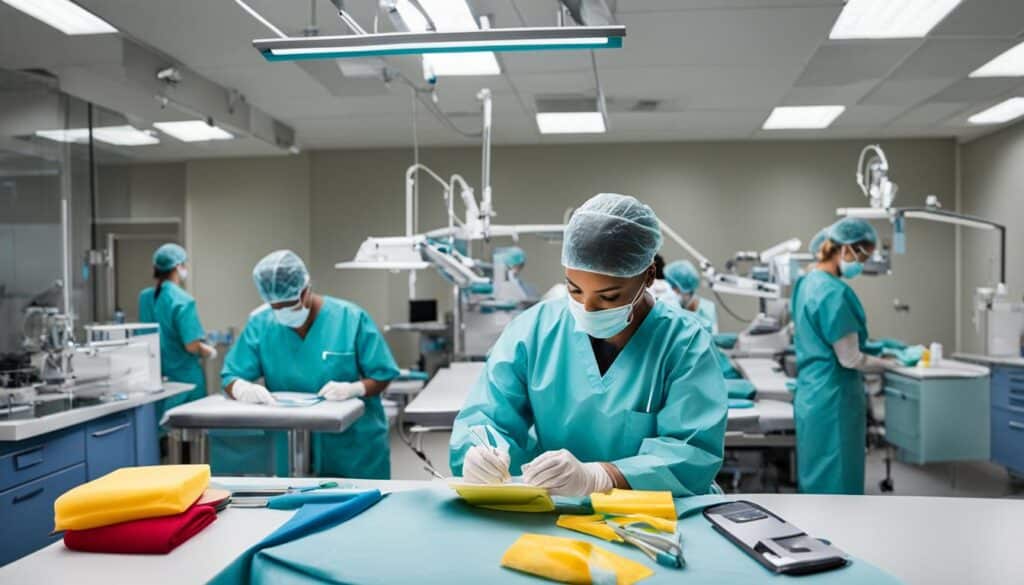What Is Surgical Technology : A surgical technologist, also known as a surgical tech, is a crucial member of the healthcare team in the operating room. They work alongside surgeons, nurses, and other medical professionals to ensure the efficiency and safety of surgical procedures. Surgical technologists are responsible for preparing the operating room, assisting during surgery, and providing post-operative care. This career offers opportunities for advancement and requires completion of a surgical technology program.
Key Takeaways:
- Surgical technologists play a vital role in the operating room, assisting surgeons and ensuring the safety of surgical procedures.
- They prepare the operating room, assist during surgery, and provide post-operative care.
- A career as a surgical technologist requires completion of a surgical technology program.
- Surgical technologists have opportunities for advancement and specialization.
- The job outlook for surgical technologists is expected to grow due to advancements in medical technology and the increasing demand for surgical procedures.
The Role of a Surgical Technologist
Before a surgical procedure, a surgical technologist plays a crucial role in preparing the operating room and ensuring everything is in order. Their duties include:
- Setting up instruments and equipment
- Ensuring proper functioning and sterilization
- Gathering necessary solutions and medications
During surgery, surgical technologists assist the surgeon by:
- Handing instruments
- Holding organs
- Maintaining a sterile environment
After the operation, their responsibilities may include:
- Dressing the wound
- Transporting patients
- Restocking the operating room
A surgical technologist’s education and training are essential for performing these tasks effectively. They must complete a surgical technology program, which covers:
Anatomy and physiology
Patient safety and infection prevention
Surgical equipment and techniques
Hands-on clinical experience
Also Read : American Public University Online Degrees & Info
To enhance job prospects and meet state regulations, many surgical technologists choose to become certified. Certification is available through organizations like the National Board of Surgical Technology and Surgical Assisting (NBSTSA).
Also Read : Your Complete Guide to Auto-Owners Insurance
Surgical Technologists in Inpatient and Outpatient Settings
Surgical technologists play a vital role in both inpatient and outpatient settings, supporting surgical procedures in hospitals and outpatient centers. Understanding the differences between inpatient and outpatient surgeries is essential for surgical technologists to provide optimal care to patients.
Also Read : Best Pet Insurance Plans for Your Furry Friends
Inpatient Surgeries
Inpatient surgeries involve procedures that require patients to stay in the hospital overnight. These surgeries typically encompass more complex and invasive procedures, such as cardiovascular surgeries or urinary system surgeries. The duration of inpatient surgeries can vary depending on the complexity of the procedure and the patient’s recovery process.
Also Read : Unlock Your Future with a University Scholarship
Outpatient Surgeries
Outpatient surgeries, on the other hand, allow patients to return home on the same day as the procedure. These surgeries are often less invasive and require minimal recovery time. Common outpatient surgeries include procedures on the nose, mouth, or eye, as well as minor orthopedic surgeries.
Also Read : What Role Should Universities Play in Career Preparation?
Both inpatient and outpatient surgeries require surgical technologists to possess strong technical skills, attention to detail, and the ability to provide support and assistance to the surgical team.
Surgical Technologist Job Outlook
The job outlook for surgical technologists is promising, driven by advancements in medical technology and the increasing demand for surgical procedures. According to the Bureau of Labor Statistics, employment of surgical technologists is projected to grow 7 percent from 2019 to 2029, faster than the average for all occupations.
This growth can be attributed to several factors, including the aging population, which may require more surgical interventions, as well as advancements in medical technology that allow for less invasive surgical techniques. Surgical technologists who stay up-to-date with the latest technological advancements and continually enhance their skills will have favorable job prospects.

Surgical technologists in both inpatient and outpatient settings contribute to the success of surgical procedures, ensuring patient safety and optimal outcomes. Their skills, expertise, and dedication make them valuable members of the healthcare team.
Specializations in Surgical Technology
While many surgical technologists work in general surgery, some choose to specialize in a specific area. Specializing in a particular surgical area allows technologists to develop expertise and focus on procedures unique to that field. Some of the common specialized surgical areas in which surgical technologists can specialize include:
- Cardiology
- Neurosurgery
- Organ transplantation
- Orthopedics
- Pediatric surgery
- Plastic surgery
By specializing in one of these areas, surgical technologists can gain in-depth knowledge and experience in their chosen field. This allows them to provide specialized support and assistance during procedures, ensuring the best possible outcomes for patients.
Image:

Work Environment and Schedule for Surgical Technologists
Surgical technologists work in a variety of healthcare settings, including hospital operating rooms, outpatient centers, and doctors’ offices. Their primary workspace is the operating room, where they play a critical role in ensuring the smooth progress of surgical procedures. From prepping for surgeries to providing assistance during operations and cleaning up afterward, surgical technologists are invaluable members of the surgical team.
The work environment of surgical technologists can be physically demanding. They often stand for extended periods and are required to wear sterile gowns and gloves to maintain a sterile operating environment. The nature of their work requires them to pay close attention to detail and follow strict protocols to ensure patient safety.
The work schedule for surgical technologists can vary depending on the healthcare facility they work in. They may work full-time, part-time, or on a per-diem basis. Surgical technologists’ schedules can include day, evening, or night shifts, as well as weekends, holidays, and on-call shifts. Their presence is crucial as surgeries may take place at any time, including emergencies that require immediate attention.
To provide a comprehensive overview, here is a table summarizing the work environment and schedule for surgical technologists:
| Work Environment | Work Schedule |
|---|---|
| Hospital operating rooms | Full-time, part-time, per-diem |
| Outpatient centers | Day, evening, night shifts |
| Doctors’ offices | Weekends, holidays, on-call shifts |
While the work environment of surgical technologists can be fast-paced and physically demanding, it offers a rewarding career in the healthcare field and the opportunity to contribute to the success of surgical procedures.

Education and Training for Surgical Technologists
To become a surgical technologist, individuals must complete a surgical technology program. These programs provide the necessary knowledge and skills to excel in this career field. The duration of these programs can vary, with some lasting only a few months, while others span up to two years. Various educational institutions offer surgical technology programs, including community colleges, vocational schools, and hospitals.
During the program, students receive a comprehensive education in various subjects relevant to surgical technology. The curriculum typically includes courses in anatomy, physiology, patient safety, infection prevention, and surgical equipment. These foundational courses lay the groundwork for understanding the human body, maintaining a sterile environment, and using instruments and technology effectively.
Hands-on clinical experience is a crucial component of surgical technologist training. Students have the opportunity to apply their knowledge in real-world settings and gain practical skills under the supervision of experienced professionals. This clinical experience allows students to develop competency in assisting during surgeries, ensuring proper instrument sterilization, and anticipating the needs of the surgical team.
While completion of a surgical technology program is the primary requirement for entering the field, some surgical technologists choose to pursue additional certifications. Certification can enhance job prospects and provide opportunities for career advancement. The most common certification for surgical technologists is the Certified Surgical Technologist (CST) credential, offered by the National Board of Surgical Technology and Surgical Assisting (NBSTSA). To obtain this certification, individuals must pass an exam after completing an accredited surgical technology program.

“A surgical technology program provides the necessary foundation for a successful career as a surgical technologist. It offers a comprehensive curriculum and hands-on clinical training, ensuring graduates are well-prepared for the demands of the operating room. Pursuing certification further demonstrates a commitment to excellence and professional growth in this rewarding field.” – Dr. Sarah Thompson, Director of Surgical Technology Program.
Certification and Advancement for Surgical Technologists
Certification is a valuable achievement for surgical technologists and is highly regarded by employers in the field. The most common certification available is the Certified Surgical Technologist (CST) credential, which is offered by the National Board of Surgical Technology and Surgical Assisting (NBSTSA). To obtain certification, individuals must fulfill certain prerequisites, including the completion of an accredited surgical technology program and successfully passing the certification exam.
Obtaining surgical technologist certification demonstrates a high level of competency and dedication to the profession. It validates the knowledge and skills necessary to perform the responsibilities of a surgical technologist effectively. Certified surgical technologists may use the title CST after their name, which can enhance their professional image and increase job opportunities.
Surgical technologists who have achieved certification are also required to maintain their credentials through continuing education. This ensures that they stay updated with the latest advancements and best practices in the field, providing the highest level of patient care and safety.
Advancement opportunities are available for surgical technologists who aspire to further their careers. Some surgical technologists choose to specialize in a specific area of surgery, such as neurosurgery or orthopedics. Specialization allows them to develop expertise in their chosen field and work on more complex and specialized procedures.
Other advancement options for surgical technologists include pursuing additional education to become first surgical assistants or registered nurses. These roles require additional training and qualifications but offer higher levels of responsibility and increased job prospects. Advancement in the field of surgical technology allows professionals to continue growing in their careers and make a bigger impact in the healthcare field.
Advancement Opportunities for Surgical Technologists
Advancement opportunities for surgical technologists include:
- Becoming a first surgical assistant
- Transitioning to a registered nurse
- Specializing in a specific area of surgery
These advancements require additional education and training, but they offer the potential for higher salaries and increased job satisfaction.
| Advancement Option | Description |
|---|---|
| Becoming a First Surgical Assistant | A first surgical assistant works directly with surgeons during surgical procedures. They are responsible for performing advanced tasks, such as suturing, observing tissue for abnormalities, and providing assistance during complex surgeries. |
| Transitioning to a Registered Nurse | Surgical technologists can pursue additional education and training to become registered nurses. As registered nurses, they have a broader scope of practice and can work in various healthcare settings, not limited to the operating room. |
| Specializing in a Specific Area of Surgery | By specializing in a specific area, such as neurosurgery or orthopedics, surgical technologists can focus their expertise and work on procedures specific to that field. Specialization allows for a deeper understanding of specialized surgical techniques and practices. |
These advancement opportunities provide surgical technologists with the chance to expand their knowledge and skills, take on more challenging roles, and pursue a rewarding and fulfilling career in the healthcare industry.
Important Qualities and Skills for Surgical Technologists
Surgical technologists play a critical role in the operating room, and to excel in their profession, they must possess specific qualities and skills. These qualities and skills enable them to contribute to the success of surgical procedures and the overall well-being of patients. Let’s explore the key qualities and skills that are vital for surgical technologists:
- Detail-oriented: Surgical technologists must have excellent attention to detail. They need to meticulously account for all equipment and instruments to ensure nothing is misplaced or missing during procedures. Maintaining a sterile environment is also crucial, requiring them to adhere to strict protocols and guidelines.
- Strong communication: Clear and effective communication is essential for surgical technologists. They need to relay crucial information to other members of the surgical team promptly and accurately. This includes communicating instrument requests, patient status updates, and any other critical information that ensures seamless collaboration and patient safety.
- Dexterity and physical stamina: Surgical technologists must possess remarkable dexterity and physical stamina. They handle delicate surgical instruments with precision, assisting surgeons during procedures. Standing for long periods is often required, along with the ability to maintain focus and attention to detail throughout lengthy surgeries.
- Ability to work under pressure: The operating room can be a high-pressure environment, and surgical technologists need to thrive under such circumstances. They must remain composed and focused during intricate procedures, adhering to strict timelines and protocols.
- Stress-management skills: The ability to manage stress effectively is crucial for surgical technologists. They encounter various stressors throughout their work, including emergencies, demanding situations, and critical decision-making. Excellent stress-management skills are essential for maintaining professionalism and delivering high-quality care.
By possessing these important qualities and skills, surgical technologists can fulfill their responsibilities with proficiency, contributing to the success of surgical procedures and ensuring optimal patient outcomes.

| Qualities | Skills |
|---|---|
| Detail-oriented | Excellent attention to detail, adhering to strict protocols and guidelines, maintaining a sterile environment |
| Strong communication | Clear and effective communication, relaying crucial information to the surgical team |
| Dexterity and physical stamina | Precise handling of surgical instruments, standing for long periods, maintaining focus and precision |
| Ability to work under pressure | Remaining composed and focused during high-pressure situations, adhering to timelines and protocols |
| Stress-management skills | Effectively managing stress, staying professional in demanding situations, making critical decisions |
Licensing, Certification, and Registration for Surgical Technologists
To pursue a successful career as a surgical technologist, obtaining the necessary licenses and certifications is essential. Certification is highly recommended and can be obtained through organizations such as the National Board of Surgical Technology and Surgical Assisting (NBSTSA). Upon earning certification, individuals can use the title Certified Surgical Technologist (CST), which adds credibility and demonstrates their commitment to professionalism in the field.
“Certification is a valuable credential that validates the knowledge and skills of surgical technologists, making them highly sought after in the healthcare industry.” – John Smith, CST
Moreover, different states may have specific regulations governing the practice of surgical technologists. It is important for individuals to check with their state licensing agency to ensure compliance with all requirements. By staying updated on state regulations, surgical technologists can continue to provide exceptional care within the boundaries of the law.
In addition to certification and state requirements, many employers also require surgical technologists to hold certifications in CPR (Cardiopulmonary Resuscitation) or BLS (Basic Life Support). These certifications highlight a surgical technologist’s ability to respond effectively to emergency situations in the operating room, further enhancing their value as a healthcare professional.
Continuing education is also important for surgical technologists to stay current with advancements in the field and maintain their certifications. Regularly attending workshops, seminars, and training programs allows surgical technologists to enhance their skills, expand their knowledge base, and keep up with the latest surgical techniques and technologies.
Also Read :
Benefits of Licensing, Certification, and Registration
The licensing, certification, and registration process for surgical technologists offer several benefits:
- Enhanced career prospects: Holding relevant certifications and registrations increases employability and opens up a wide range of job opportunities.
- Professional recognition: Licensing and certification demonstrate a surgical technologist’s competence and dedication to their profession.
- Higher earning potential: Certified surgical technologists often receive higher salaries and better benefits compared to their non-certified counterparts.
- Continual professional development: The process of obtaining and renewing licenses and certifications encourages lifelong learning and professional growth.
By investing time and effort into obtaining the necessary licenses and certifications, surgical technologists position themselves for a successful and fulfilling career in the field of surgical technology.
| License/Certification | Issuing Organization | Requirements |
|---|---|---|
| CST (Certified Surgical Technologist) | NBSTSA (National Board of Surgical Technology and Surgical Assisting) |
|
| CPR (Cardiopulmonary Resuscitation) | AHA (American Heart Association) |
|
| BLS (Basic Life Support) | AHA (American Heart Association) |
|

Conclusion
Surgical technology is a crucial field within the healthcare system, providing essential support and expertise during surgical procedures. Surgical technologists play a vital role in ensuring the efficiency and safety of surgeries, working alongside surgeons and other healthcare professionals to deliver the best possible patient care.
With the right education, training, and certifications, individuals can pursue a fulfilling career as a surgical technologist. This career offers opportunities for professional growth and advancement, allowing technologists to specialize in specific surgical areas and broaden their skill set.
The importance of surgical technology cannot be understated. By employing their expertise and attention to detail, surgical technologists contribute to the success of surgeries and help improve patient outcomes. Their work is essential in maintaining a sterile environment, handling instruments, and providing perioperative care.
If you are looking for a rewarding career in the healthcare field and have a passion for assisting in surgical procedures, becoming a surgical technologist may be the right path for you. By entering this field, you can make a tangible impact on patient care and contribute to the success of surgical interventions.
FAQ
Q: What is surgical technology?
A: Surgical technology is a field within healthcare that involves assisting surgeons and other medical professionals in the operating room before, during, and after surgeries.
Q: How do I become a surgical technologist?
A: To become a surgical technologist, you typically need to complete an associate degree program in surgical technology and pass a certification exam.
Q: What do surgical technologists do?
A: Surgical technologists work alongside surgeons and other healthcare professionals in the operating room, assisting with surgical procedures, preparing operating rooms, and ensuring sterile environments.
Q: What are the requirements to become a surgical tech?
A: The requirements to become a surgical tech usually include completing an accredited surgical technology program, obtaining certification, and possibly pursuing further education or training.
Q: What is the salary range for surgical techs?
A: The salary for surgical technologists can vary based on factors such as location, level of experience, and type of healthcare facility, but the median annual wage is typically competitive.
Q: How can I apply for a surgical technology program?
A: To apply for a surgical technology program, you will need to meet the program’s admission requirements, which may include a high school diploma or equivalent, prerequisite courses, and possibly an interview process.
Q: Can I work in other healthcare settings as a surgical technologist?
A: Yes, surgical technologists can work not only in operating rooms but also in settings such as central supply departments, outpatient surgery centers, and labor and delivery departments.
Q: How can I become a surgical technologist?
A: To become a surgical technologist, you typically need to complete an associate degree in surgical technology. Some programs may also require prerequisite courses such as anatomy and medical terminology.
Q: What are the career prospects for surgical technologists?
A: Surgical technologists have good career prospects due to the demand for healthcare professionals in operating rooms. They can work in various settings such as hospitals, surgical centers, and central supply departments.
Q: What is the role of a surgical technologist throughout a surgical operation?
A: Surgical technologists assist the surgical team throughout a surgical operation by preparing the operating room, sterilizing instruments, passing tools to surgeons, and ensuring the safety and efficiency of the surgical environment.
Source Links
- https://www.webmd.com/a-to-z-guides/what-is-surgical-technologist
- https://college.mayo.edu/academics/explore-health-care-careers/careers-a-z/surgical-technologist/
- https://www.bls.gov/ooh/healthcare/surgical-technologists.htm


